What Age Can Kids Swim Unsupervised?
September 2, 2025
The #1 Rule of Water Safety: Why Children Should Never Swim Alone
As children grow, it’s natural to want to give them more freedom and independence. Whether it’s playing outside with friends, riding a bike around the neighborhood, or swimming in the pool, parents are constantly balancing independence with safety.
When it comes to swimming, one truth always stands: children should never swim unsupervised, no matter their age or skill level. Even strong, confident swimmers are at risk; drowning can happen in just seconds, silently and without warning.
Water safety isn’t about limiting your child’s fun; it’s about creating the safest environment possible so they can thrive, enjoy swimming, and build lifelong skills.
Why Supervision Matters More Than Skill
Many parents assume that once their child has learned how to swim, they no longer need close supervision. While lessons are an important layer of protection, they are not a substitute for adult presence.
According to the CDC, drowning is the leading cause of unintentional injury-related death for children ages 1-4, and the second leading cause for children under 14. Most of these tragedies occur when an adult is not actively watching.
The truth is, water demands respect, and active adult supervision is the most important safety measure you can provide.
Essential Pool Safety Rules Every Family Should Follow
1. Never Swim Alone
No matter how confident or independent your child becomes, make it a family rule that swimming only happens when an adult is present and paying attention.
2. Establish Clear Boundaries
Set pool rules, such as:
- No swimming without an adult
- No running near the pool
- No diving in shallow areas
Consistency is key - children should know these rules are non-negotiable.
3. Learn CPR
Every parent and caregiver should know how to respond in an emergency. A CPR or water safety class provides the confidence and skills to act quickly if something goes wrong.
4. Practice Active Supervision
Supervision isn’t sitting poolside scrolling on your phone. It’s watching closely, without distractions. If you’re hosting a pool day, consider a “water watcher rotation” where responsible adults take turns keeping their eyes on the swimmers.
Creating a Safe and Fun Swimming Environment
When you combine consistent supervision, strong pool rules, and water safety knowledge, you create a safe space where your child can enjoy swimming without unnecessary risks. This balance allows them to build confidence and independence while you maintain peace of mind.
Water safety isn’t about fear, it’s about empowerment. By teaching kids to respect the water and modeling responsible behaviors, you give them the tools to enjoy swimming for a lifetime.
A Final Word
At Swimming Safari Swim School, we believe every child deserves the opportunity to learn to swim in a safe, supportive environment. Our instructors not only teach water safety skills but also instill confidence, responsibility, and a lifelong love of swimming.
Learn more about our swim programs here
.

We’re excited to officially roll out our new Unlimited Makeup Class policy on 2/1. Designed to give families more flexibility, less stress, and more swim time when life happens. Because schedules change… kids get sick… and consistency in swimming matters. Let’s walk through exactly how it works and what to expect. What’s New? Instead of earning limited makeup tokens that expire quickly, families now receive unlimited makeup tokens that can be used anytime your child misses a class, as long as absences are submitted properly and on time. This upgrade means: More flexibility Less pressure to “use or lose” classes Easier scheduling Better consistency in swim progress How to Earn a Makeup Token You’ll receive a makeup token when: You submit your absence at least one hour before the class start time The absence is submitted through the parent portal or app Missed classes without prior notice will not receive a makeup token. Missed classes without prior notice will not receive a makeup token. Tip: Reporting absences is fastest and easiest through the Swimming Safari mobile app. You can submit absences, manage makeup tokens, and view your schedule all in one place. Download the app here or search “Swimming Safari Swim School” in your app store: Apple Google Play How Makeup Tokens Work Families receive unlimited makeup tokens for reported absences Absences must be reported ahead of time (at least 1 hour before class) Absences are reported in the Parent Portal (website or app) Unreported absences do not receive a makeup token When reported correctly, a makeup token is automatically added Makeup tokens are valid for 365 days Makeup classes must be scheduled in the Parent Portal (website or app) Makeup classes can be scheduled within a 6-day window This policy is a trial through May How to Schedule a Makeup Class Once you’ve earned a token, simply log into your Parent Portal and schedule a makeup class that works for your family’s schedule. Watch: How to Schedule a Makeup Token How to Submit an Absence (So You Get Your Token) To earn your makeup token, absences must be submitted in advance through the Parent Portal . Watch: How to Submit a Future Absence on our app or on desktop . Need Help Logging In? If you’ve forgotten your password or need portal access help: Watch how: How to Change Your Password on the Parent Portal How to add a secondary guardian on the Parent Portal Why We Made This Change At Swimming Safari Swim School, our mission is safety, consistency, and confidence in the water, and we know families are busy. This new policy gives you: More control More flexibility More swim time And most importantly, more peace of mind. We’re Here to Help If you ever have questions, our Safari Guides are happy to help walk you through the system or help you book your first makeup class. — Your Swimming Safari Guides *The Flying Lions Swim Team is excluded from the make up policy.
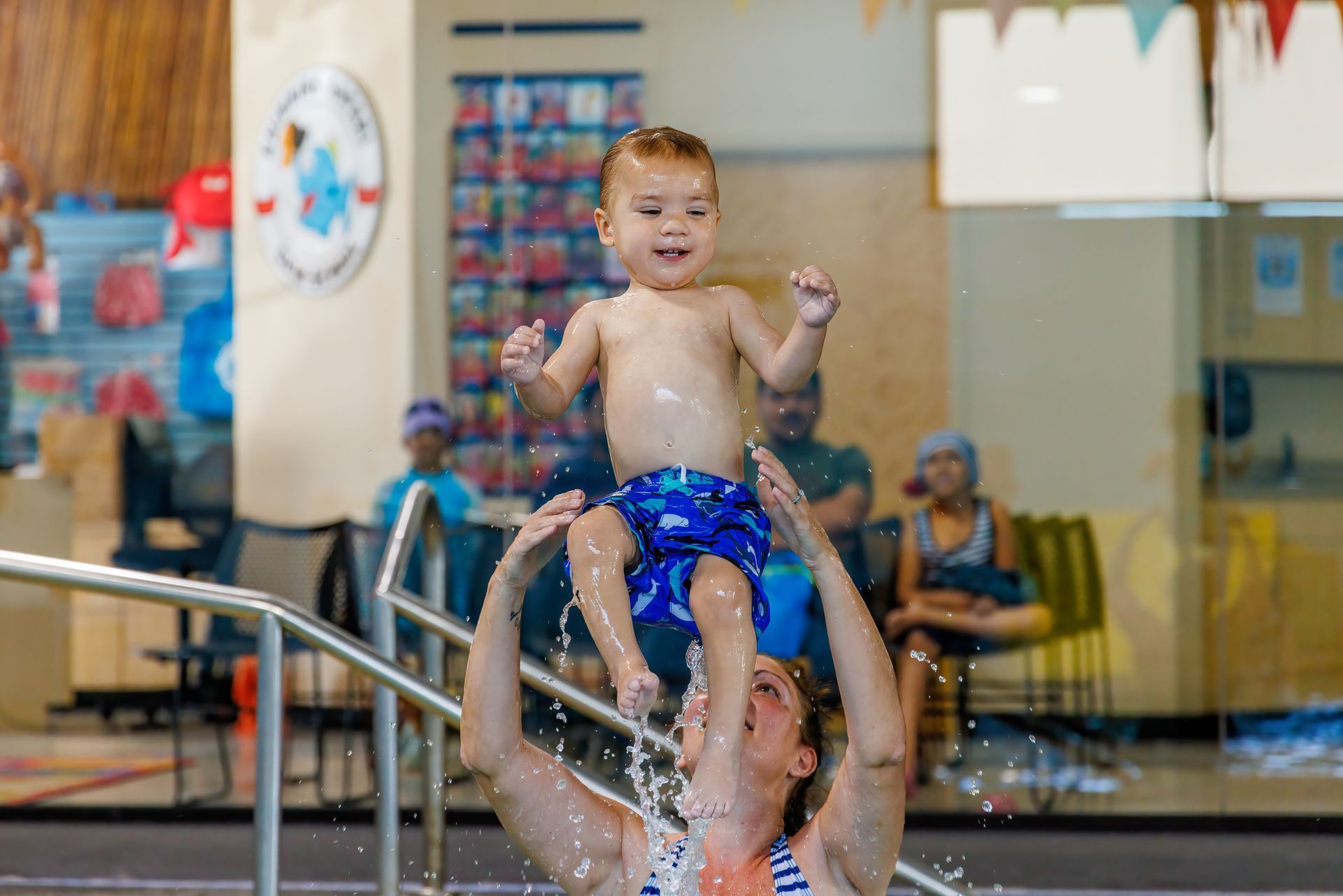
Confidence in Small Steps Every child faces moments that feel big and a little scary. Without gentle opportunities to practice bravery, those fears can grow. How Swimming Builds Courage Swim lessons provide safe, structured ways for babies to: Try new things like back floating or going under briefly Gain independence by moving toward a parent or toy Take turns and share space with others Each small victory builds resilience and self-assurance. Beyond Swimming Confidence gained in the pool carries over into everyday life. From learning to walk, to making friends, to starting school, courage grows with every splash. Pro Tip: Celebrate effort, not just achievement. “You tried so hard!” is just as powerful as “You did it!” Start building your child’s confidence now. Book a free trial class at Swimming Safari.
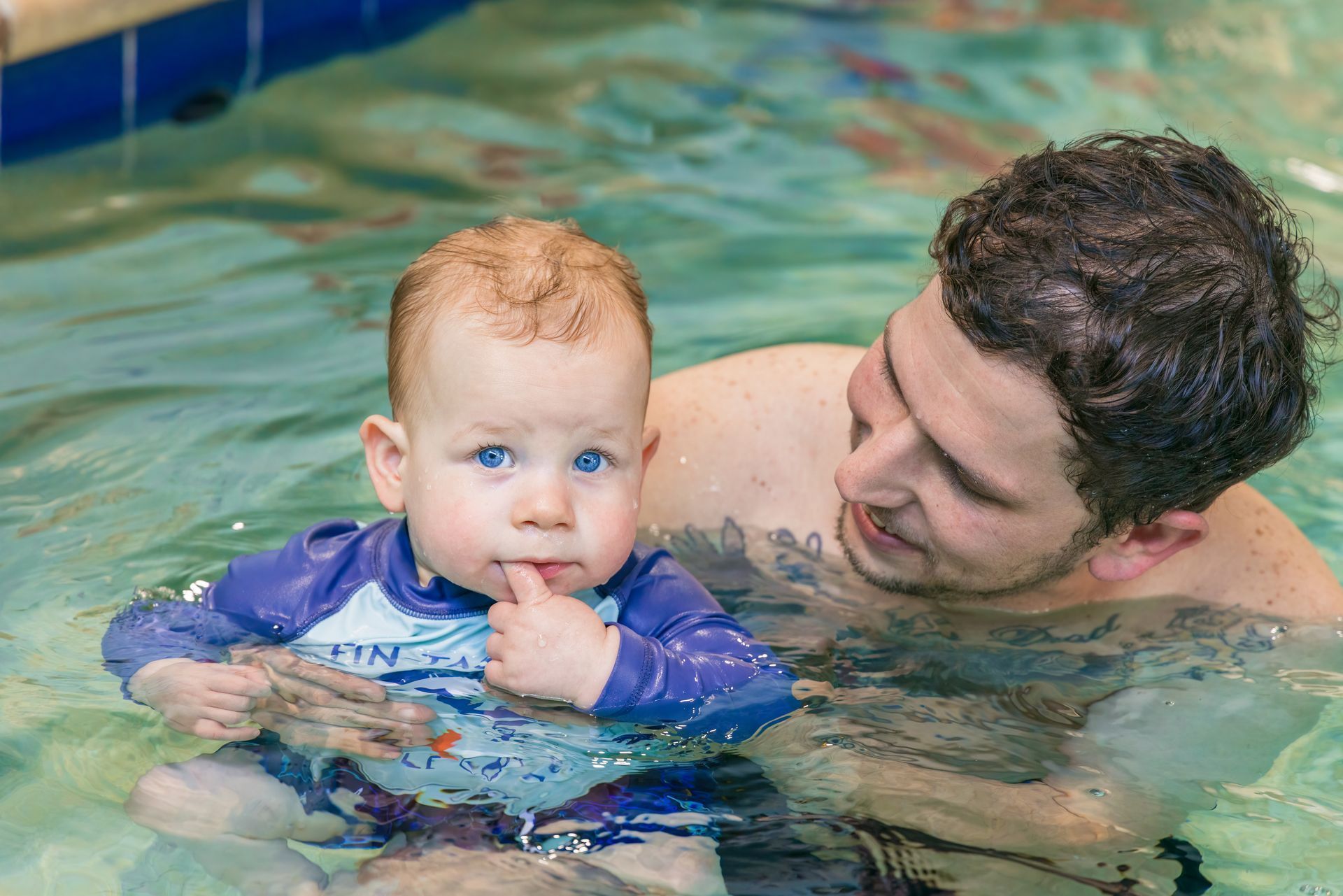
The Risk Parents Don’t Expect Water is one of the leading risks for young children. Many parents wait until their child is “older” to think about lessons—but water safety habits can start long before then. What Babies Can Learn Early Even before their 2nd birthday, little ones can: Practice short moments of breath-holding Get comfortable floating on their backs Turn toward a parent or the pool’s edge for safety These are taught gently, through games and songs that feel natural and fun. Why Early Matters The earlier your baby begins, the more confident and comfortable they’ll be in the water as they grow. That confidence means safety and peace of mind for you. Pro Tip: Practice blowing bubbles in the bath; it’s the perfect way to introduce breath control. Give your baby a safe start in the water. Join us for a free trial class.
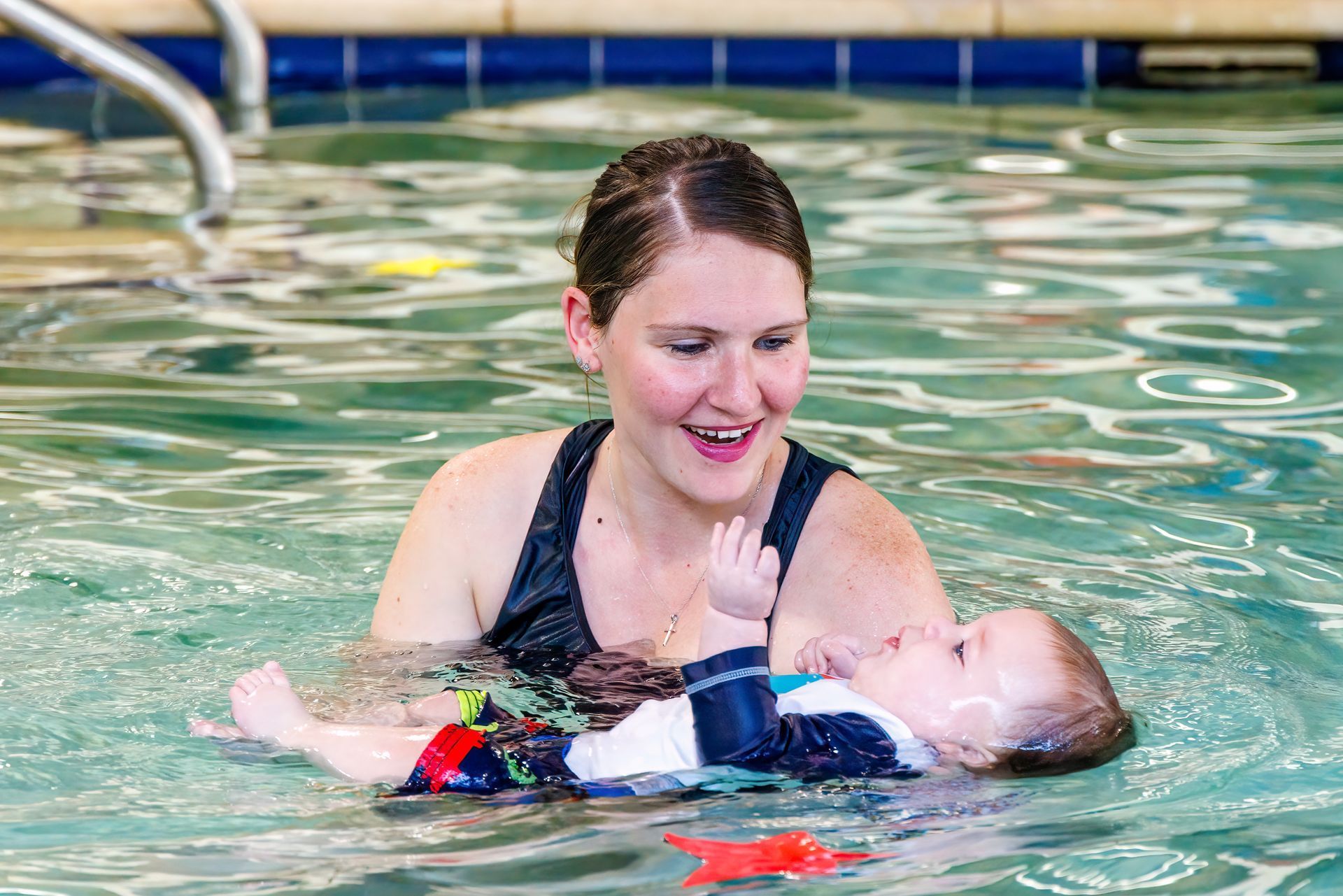
Why Early Development Matters The first two years of life are when your baby’s brain develops faster than it ever will again. Every experience sounds, movements, touches builds connections that shape their growth. How Swimming Boosts Development Swim lessons engage your baby in all areas at once: Cognitive: Following songs, cues, and instructor guidance. Physical: Building strength through kicking, splashing, and reaching. Emotional: Feeling secure in your arms while trying new challenges. Social: Watching, imitating, and playing alongside peers. Beyond the Pool The skills your baby practices in the water, focus, coordination, and confidence, translate into learning and growth in every part of their world. Pro Tip: Celebrate every small splash; encouragement builds confidence that sticks. Want to see your child’s giggles turn into growth? Book a free trial class today.
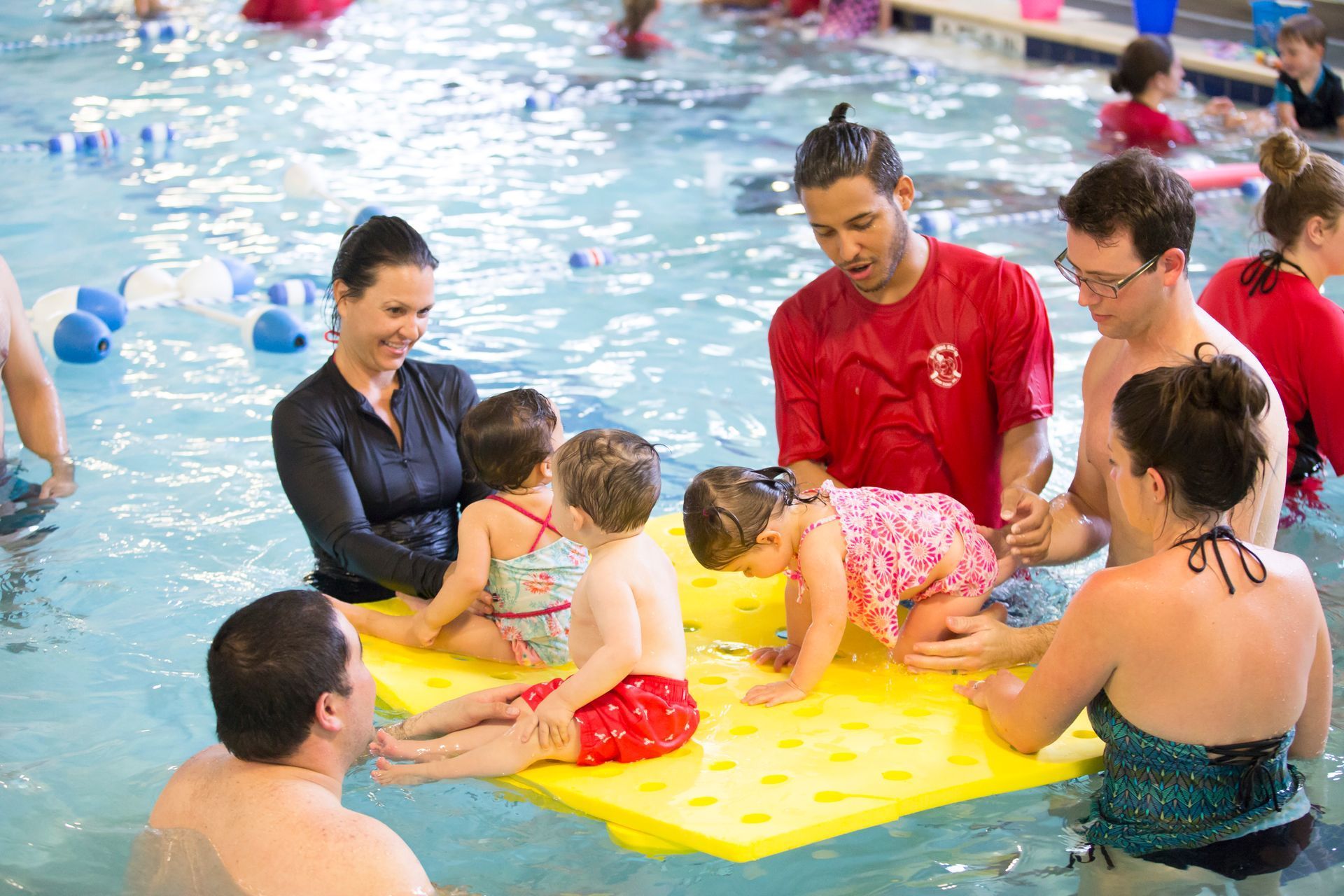
The Problem with Going It Alone Parenting a little one can sometimes feel isolating. Babies who only interact with family members may also miss out on early opportunities to practice social skills. How Swim Lessons Help Babies Socialize Watch & Learn: Babies naturally imitate others, seeing peers splashing builds excitement. Shared Play: Passing toys or playing group games introduces sharing and teamwork. Group Listening: Following instructor-led songs helps babies practice focus in a fun way. The Bonus for Parents Swim classes aren’t just for babies, they’re for you, too! You’ll meet other families, share stories, and build a network of support that understands your parenting journey. The Long-Term Payoff Early social experiences help your child develop confidence, empathy, and communication skills that last well beyond swim lessons. Pro Tip: Say hello to another parent in class, you might walk away with both a swimming partner and a new friend. Discover the joy of swimming and socializing. Book your free trial lesson today.
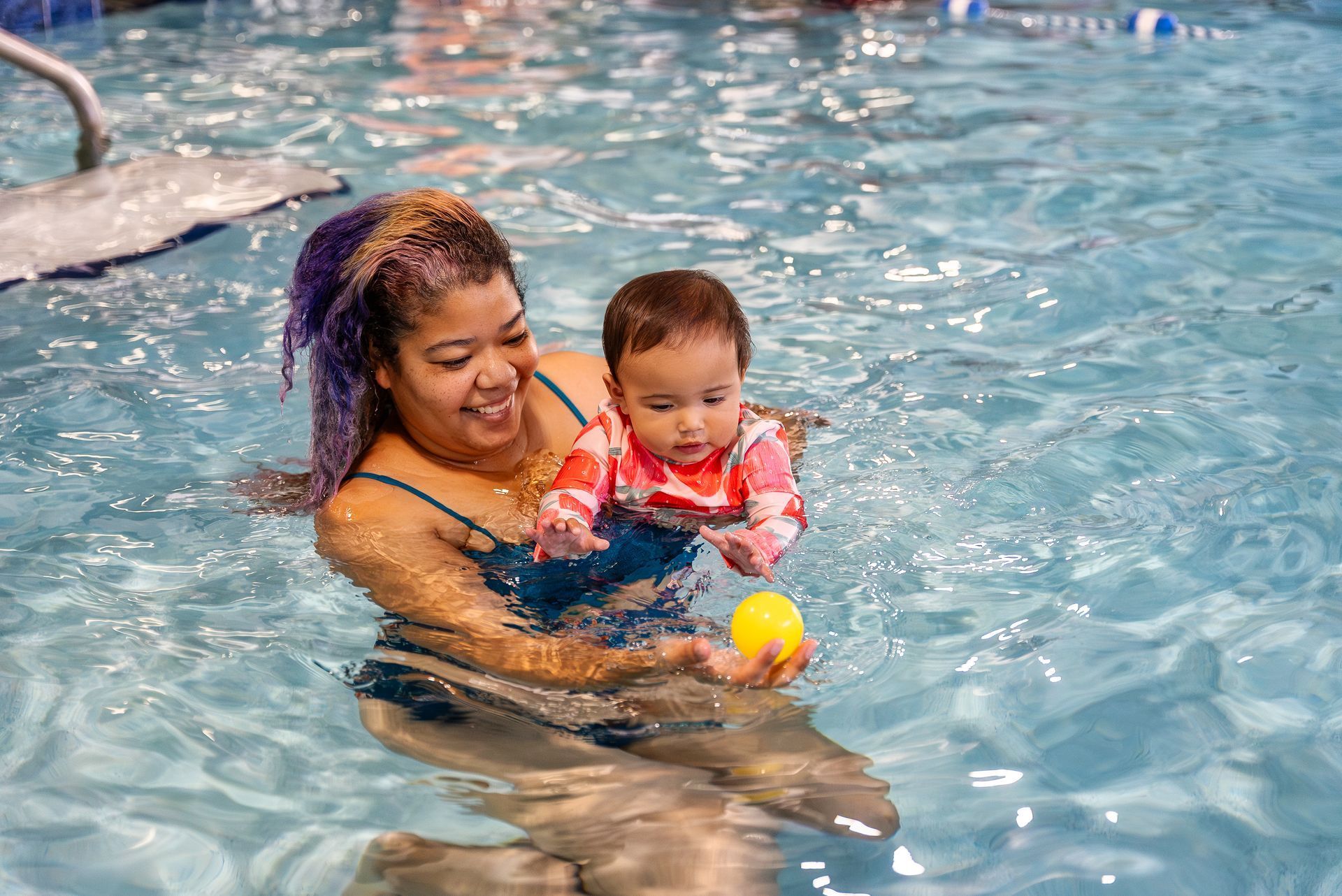
Why Motor Skills Are Important From rolling over to crawling, every new movement strengthens your baby’s body and brain. These skills are also the foundation for confident swimming. Without practice, babies can feel frustrated as they try to master big new milestones. Simple Ways to Build Motor Skills at Home Reach & Grab: Place toys in shallow water for your baby to grab, building strength and coordination. Kick & Splash: Hold them gently on their back and let them kick—great for leg strength and future swim strokes. Roll Over Play: Practice rolling on a mat or soft surface to mimic the pool skill of turning over for safety. Motor Skills in Swim Lessons Swim lessons enhance these natural milestones with songs, games, and guided movements. The water adds gentle resistance, helping babies develop strong muscles while having fun. Pro Tip: Cheer for every little success. Encouragement builds your baby’s confidence to try again. See your baby’s motor skills soar in the pool! Join us for a free trial class .
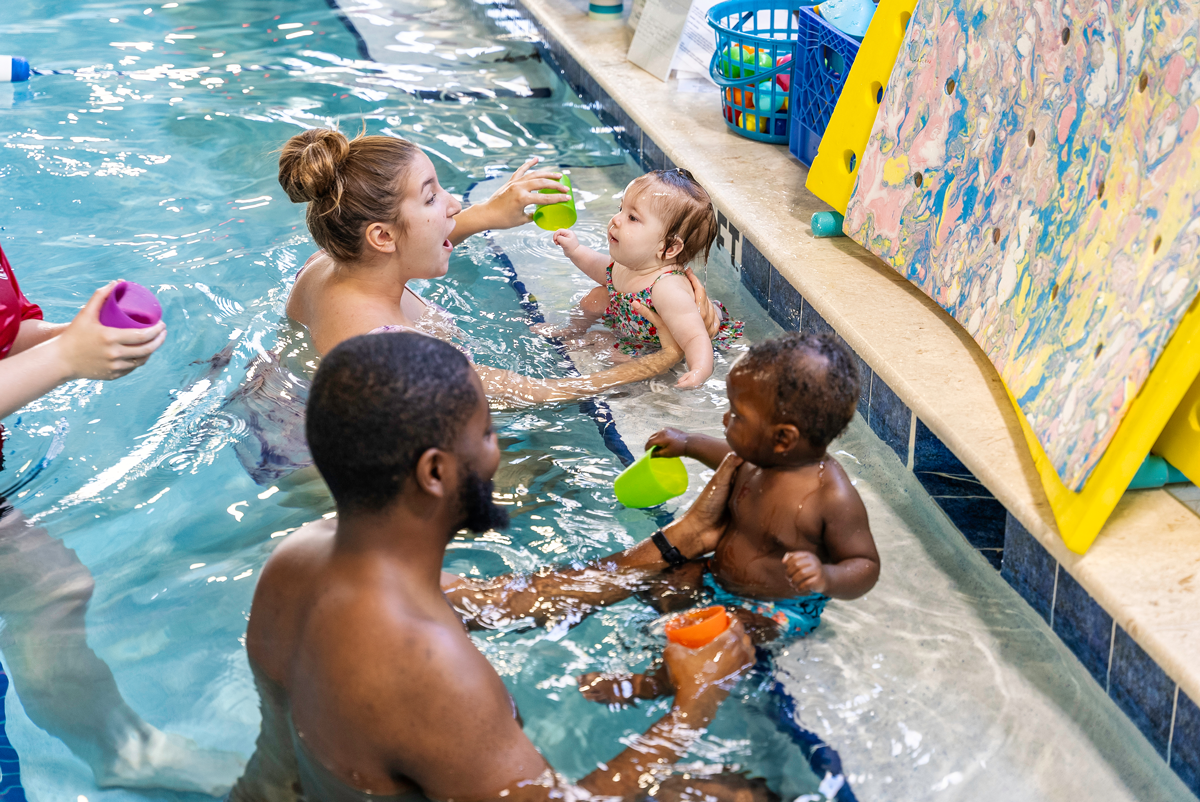
Why Bath Time Matters Bath time isn’t just about keeping your baby clean—it’s an opportunity for learning and development. Babies who regularly experience water in a fun, playful setting are less likely to develop fear of the pool later on. Build Confidence Through Play Pouring Water Gently: Start by letting water trickle over their shoulders or arms to reduce sensitivity. Bubble Blowing: Encourage your baby to blow bubbles in the water—it’s a fun introduction to breath control. Floating Toys: Place toys slightly out of reach to practice splashing, grabbing, and hand-eye coordination. The Long-Term Benefit Playful water exposure turns the pool from something scary into something familiar. When swim lessons begin, your baby will already feel comfortable and excited about water. Pro Tip: Keep it fun and short; just a few minutes of water play can make a huge difference. Ready to build on bath time skills? Book your free trial class at Swimming Safari Swim School.
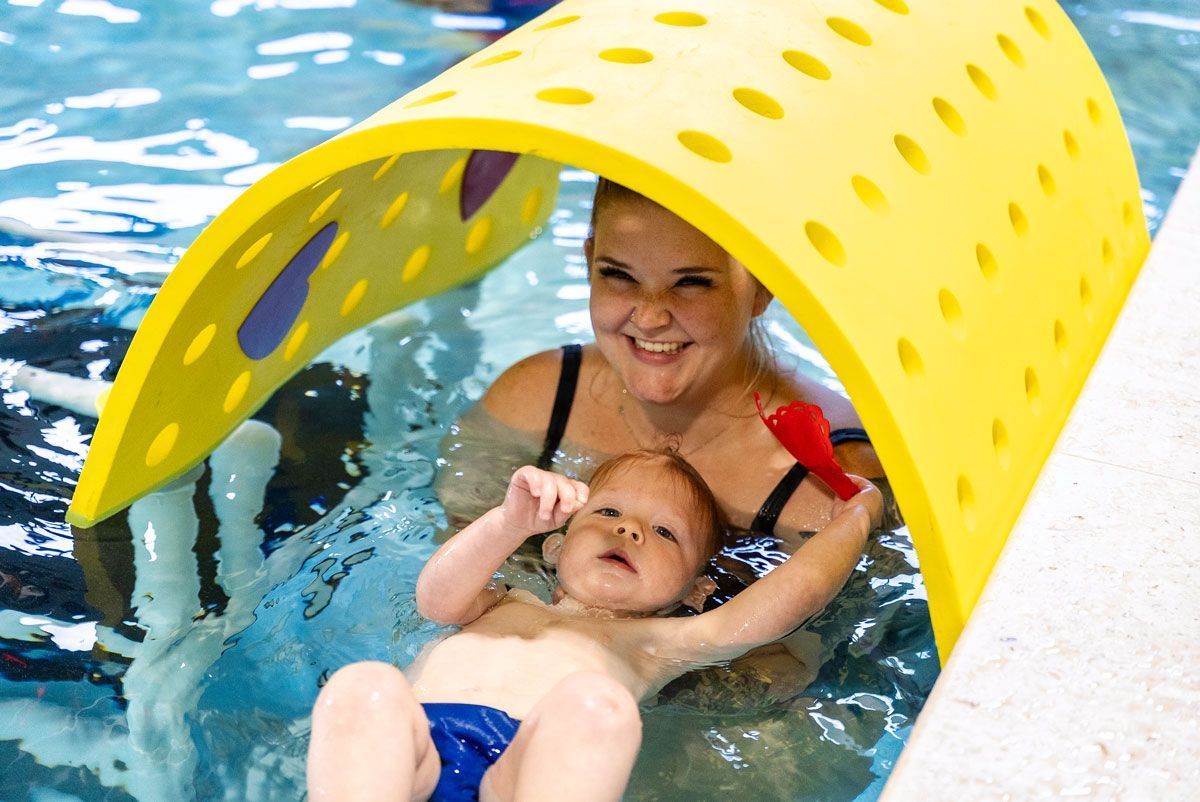
Does the thought of your baby’s first swim lesson make you a little nervous? You’re not alone! Many parents wonder how to prepare their child so the pool feels safe, fun, and familiar. The good news is you already have the perfect practice pool: your bathtub. 3 Bath-Time Games That Prepare Your Baby for Swim Lessons The Waterfall Game – Gently pour water over your baby’s shoulders and head. Encourage blinking and smiling. This builds comfort with water on the face. Bubble Blowing – Demonstrate blowing bubbles in the water. Even if your baby doesn’t copy right away, they’ll watch, learn, and eventually try. Toy Diving – Drop a toy that floats and encourage your baby to reach and grab it. This strengthens motor skills and introduces early submersion concepts. Why Bath Practice Works It’s a familiar, safe space for your baby. Short, playful exposure reduces fear. Builds a foundation that makes swim lessons smoother. Parent Tip Make bath practice consistent by ending each bath with one quick “game.” That way, it becomes part of the routine, not something new or scary. Bath time is more than just bubbles, it’s an opportunity to build water confidence that sets your child up for success in swim lessons. Want to see these skills in action? Book your free trial swim class today!
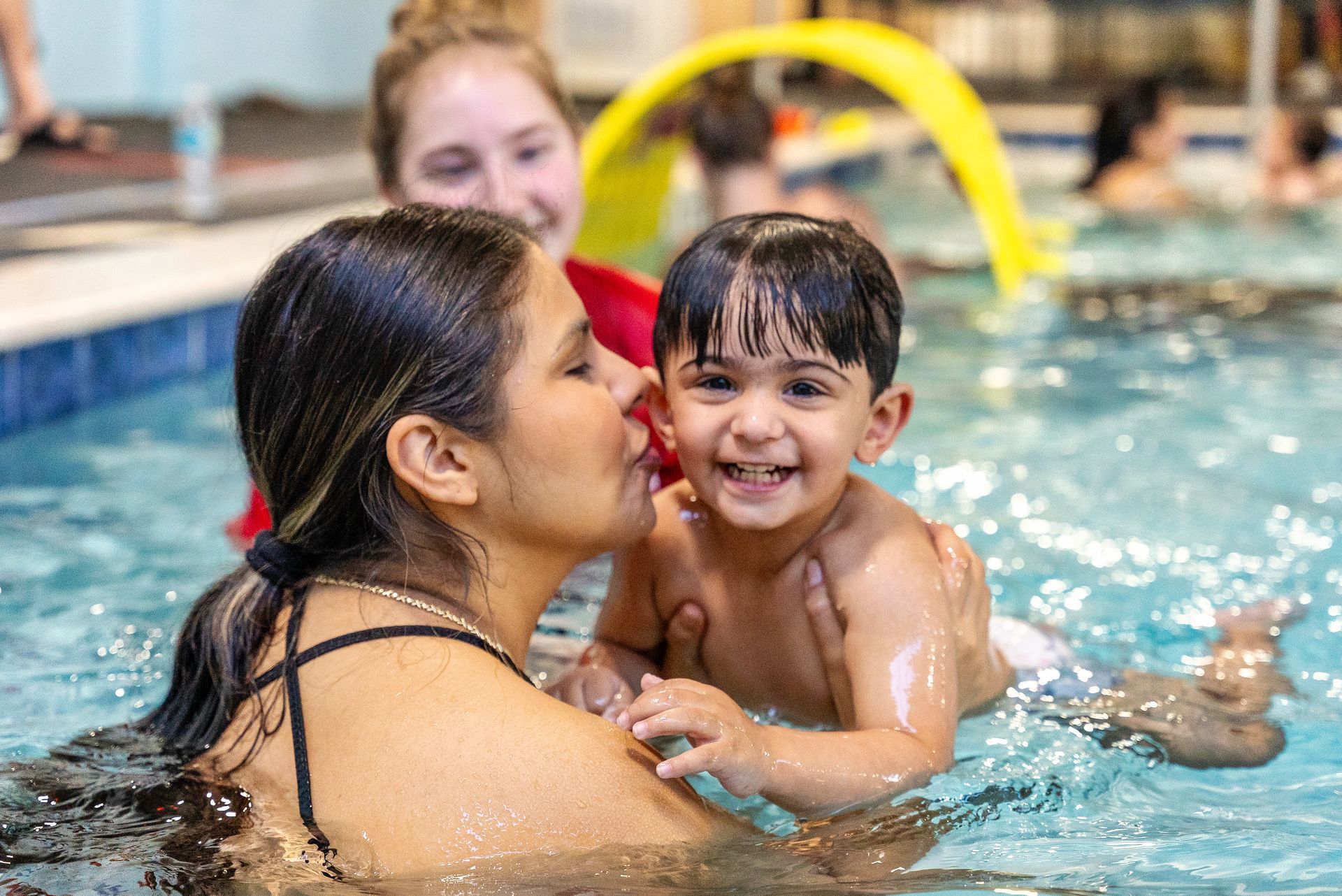
The first two years of life are full of incredible growth. From rolling over to crawling, walking, and eventually running, babies are learning new skills at lightning speed. But did you know that water play can actually support these milestones? Why Water Play is So Beneficial Water is a unique environment that challenges your baby’s muscles, balance, and coordination in ways land-based play can’t. 3 Ways Swim Lessons Boost Milestones Kicking Builds Strength – Holding your baby under the arms and letting them kick in the water helps strengthen core and leg muscles, which are essential for crawling and walking. Reaching Builds Coordination – Babies practice hand-eye coordination when reaching for floating toys. This supports fine motor skill development. Singing Builds Language Skills – Songs and rhymes in swim class support rhythm, repetition, and vocabulary, all important for language development. Social and Emotional Benefits Group lessons also provide early exposure to peers, helping babies learn trust, confidence, and the beginnings of social interaction. Why Timing Matters Babies’ brains are most adaptable before age 2. Introducing safe, structured water play during this window means faster learning and longer-lasting confidence. Swim lessons aren’t just about safety, they’re about supporting your baby’s whole development. Want to see how we combine safety + development? Come try a free class with us!
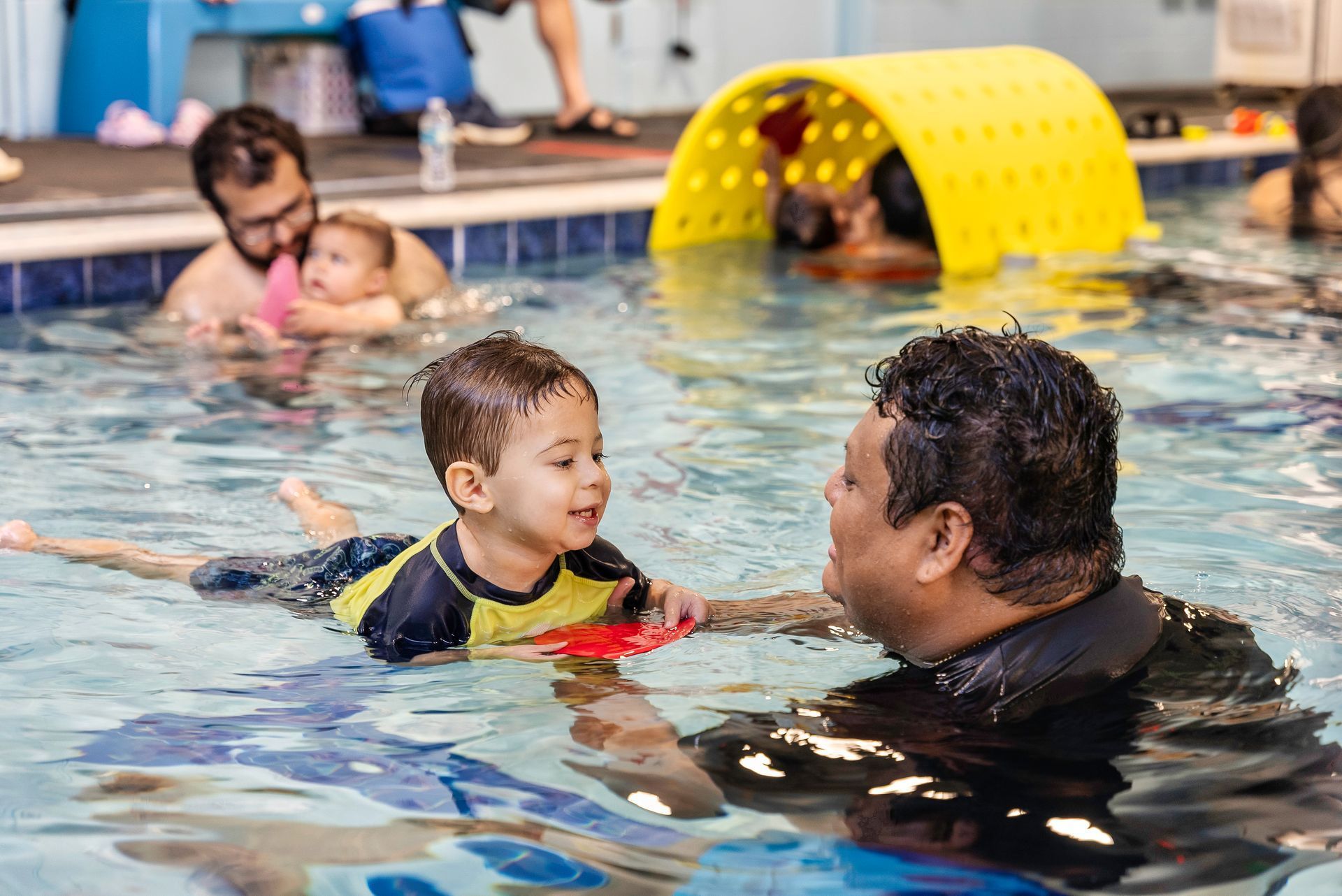
When you think of keeping your baby safe, you might picture outlet covers, stair gates, or car seats. But did you know the leading cause of accidental death for children under 4 is drowning? For parents of babies and toddlers, water safety needs to be at the top of the list, whether you have a backyard pool or just a bathtub. The Truth About Drowning It’s fast: It can happen in less than 30 seconds. It’s silent: There’s no splashing or yelling, and children slip under quietly. It can happen anywhere: Pools, bathtubs, even small buckets of water. 3 Ways to Keep Babies Safe Around Water Touch Supervision – Always keep your baby within arm’s reach when near water. Even a “quick second” to grab a towel can be too long. Create Early Water Rules – Use a consistent phrase like “Wait for Mommy/Daddy” before entering the water. Babies may not fully understand yet, but consistency builds safety habits. Enroll in Swim Lessons Early – Lessons for babies under 2 focus on comfort, safety awareness, and respect for water, not just “swimming.” These early exposures can save lives. Why Early Swim Lessons Matter Water safety isn’t something that starts at age 4 or 5, it begins the moment your child is mobile. The earlier they are introduced to water in a structured, safe way, the more confident (and safe) they will become. Water safety doesn’t need to be scary. With simple habits and professional guidance, you can enjoy family pool time with peace of mind. Ready to take the next step? Book your baby’s free trial swim class today!

